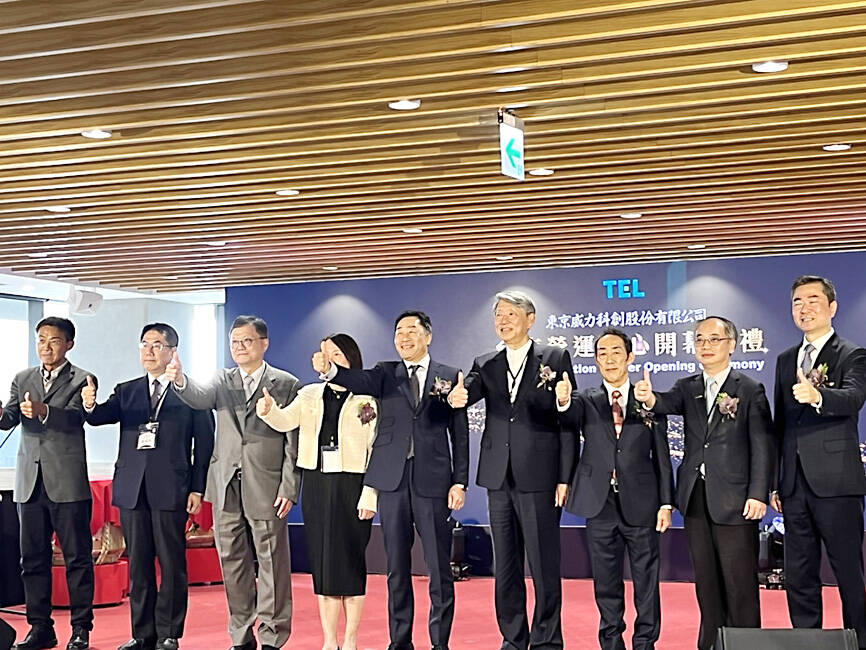Tokyo Electron Ltd, Asia’s biggest semiconductor equipment supplier, yesterday launched a NT$2 billion (US$61.5 million) operations center in Tainan as it aims to expand capacity and meet growing demand.
Its new Taiwan Operations Center is expected to help customers release their products faster, boost production efficiency and shorten equipment repair time in a cost-effective way, the company said.
The center is about a five-minute drive from the factories of its major customers such as Taiwan Semiconductor Manufacturing Co’s (TSMC, 台積電) advanced 3-nanometer and 2-nanometer fabs.

Photo: Grace Hung, Taipei Times
The operations center would have about 1,000 employees when it is fully utilized, the company said.
TSMC vice president T.S. Chang (張宗生), who oversees advanced technology and mask engineering, attended the center’s opening ceremony, along with United Microelectronics Co (聯電) and Winbond Electronics Corp (華邦電) representatives.
“With the opening of this operations center, we aim to reach two goals: First, we aim to expand our scale to cope with the ongoing growth of the Taiwanese market. Second, we hope to shorten the product repairing time cycle and to broaden the supply chain,” Tokyo Electron Taiwan Ltd chairman Hikaru Ito said at the ceremony.
The six-floor facility is comprised of a repair center and a testing lab to provide customers with one-stop services, as Taiwan plays a key role in the global artificial intelligence (AI) industry, Tokyo Electron Taiwan president Roger Chang (張天豪) said.
For the first time, the company can help fix vacuum transpiration robotic arms used in semiconductor equipment for customers in Taiwan, it said.
In the past, it took about seven months to complete the whole repair process in Japan, compared with one to two months now, it said.
The new repair center would also help customers fix damaged ovens used in lithography equipment, it said.
The company is mulling to build a more resilient supply chain in Taiwan through sourcing key parts locally, it said, adding that it has a shortlist of potential suppliers.
Taiwan has become the fourth-biggest market for the company, accounting for 13.3 percent of its total revenue in the second quarter, a spike from 9.3 percent a year earlier, a company financial statement showed.
The new operations center demonstrates the close partnership between Taiwan and Japan in the semiconductor field, Minister of Economic Affairs J.W. Kuo (郭智輝) said at the opening ceremony.

WEAKER ACTIVITY: The sharpest deterioration was seen in the electronics and optical components sector, with the production index falling 13.2 points to 44.5 Taiwan’s manufacturing sector last month contracted for a second consecutive month, with the purchasing managers’ index (PMI) slipping to 48, reflecting ongoing caution over trade uncertainties, the Chung-Hua Institution for Economic Research (CIER, 中華經濟研究院) said yesterday. The decline reflects growing caution among companies amid uncertainty surrounding US tariffs, semiconductor duties and automotive import levies, and it is also likely linked to fading front-loading activity, CIER president Lien Hsien-ming (連賢明) said. “Some clients have started shifting orders to Southeast Asian countries where tariff regimes are already clear,” Lien told a news conference. Firms across the supply chain are also lowering stock levels to mitigate

Six Taiwanese companies, including contract chipmaker Taiwan Semiconductor Manufacturing Co (TSMC, 台積電), made the 2025 Fortune Global 500 list of the world’s largest firms by revenue. In a report published by New York-based Fortune magazine on Tuesday, Hon Hai Precision Industry Co (鴻海精密), also known as Foxconn Technology Group (富士康科技集團), ranked highest among Taiwanese firms, placing 28th with revenue of US$213.69 billion. Up 60 spots from last year, TSMC rose to No. 126 with US$90.16 billion in revenue, followed by Quanta Computer Inc (廣達) at 348th, Pegatron Corp (和碩) at 461st, CPC Corp, Taiwan (台灣中油) at 494th and Wistron Corp (緯創) at

NEGOTIATIONS: Semiconductors play an outsized role in Taiwan’s industrial and economic development and are a major driver of the Taiwan-US trade imbalance With US President Donald Trump threatening to impose tariffs on semiconductors, Taiwan is expected to face a significant challenge, as information and communications technology (ICT) products account for more than 70 percent of its exports to the US, Chung-Hua Institution for Economic Research (CIER, 中華經濟研究院) president Lien Hsien-ming (連賢明) said on Friday. Compared with other countries, semiconductors play a disproportionately large role in Taiwan’s industrial and economic development, Lien said. As the sixth-largest contributor to the US trade deficit, Taiwan recorded a US$73.9 billion trade surplus with the US last year — up from US$47.8 billion in 2023 — driven by strong

ASE Technology Holding Co (ASE, 日月光投控), the world’s biggest chip assembly and testing service provider, yesterday said it would boost equipment capital expenditure by up to 16 percent for this year to cope with strong customer demand for artificial intelligence (AI) applications. Aside from AI, a growing demand for semiconductors used in the automotive and industrial sectors is to drive ASE’s capacity next year, the Kaohsiung-based company said. “We do see the disparity between AI and other general sectors, and that pretty much aligns the scenario in the first half of this year,” ASE chief operating officer Tien Wu (吳田玉) told an